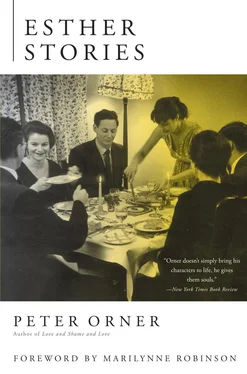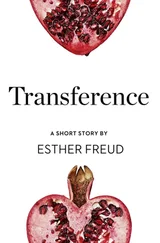They ran a picture of Travis Oarly in the paper. It was from the year he’d been a student in the teacher’s class. One of those school photographers must have had a hell of a time coaxing him to smile. Him sitting before one of those godawful cloud-blue backgrounds. His cropped hair looking like somebody had cut it with a thresher. They must have made a compromise: if Travis smiled, he got to close his eyes. His smile was more a twitch. His eyes pencil points staring out between nearly closed lids. So much retreat in those eyes it was impossible not to cry out for him in spite of the article that went with the picture. Well, maybe it was impossible for her not to. If her mother could hear what she was thinking, she’d say, Janet’s heart bleeds for every stranger, but her hands are allergic to work. Feeling sorry for a killer, what about those motherless children? Huh, Janet? A murder in some town in Illinois, people you don’t even know. Now let’s talk about how many jobs you’ve quit in the past year and how many cards you never sent to Grandma Danner. You think she grows Nordstroms in the yard?
Janet sat down and leaned against the tree, felt the wet seep through her jeans. She knows he did it, that the speculation about other people being involved was shit, a desperate attempt by a lawyer with zero to divert attention from the obvious. The newspaper passed it on to sell more papers. Fool cops and lawyers, reporters — any answer you want’s right there in the school picture. Anybody with half an ounce of humanity would have been kind to a boy who couldn’t force himself to look out his own eyes, and maybe he wanted that kindness back. Or maybe he hated her for it. Janet gazed out at what she could still see of the flattened boggy fields and the cluster of abandoned farm buildings. Somewhere over there stood the corncrib where they found him. The rusting equipment, blacker shadows against the darkening gray. To the east, behind her, the rectangled light of a single inhabited trailer in the distance across the fields. Soon the sky and the ground will turn the same dull black, the color of the tree itself. I won’t go back to the car, she whispered. Not yet. She took off her shoes and rubbed them in the soft slick of mud.
She thought of his seeing her, after so many years, seeing her.
Everything’s lonely today. Even his hands on the wheel are lonely today.
(And her mother asking quietly, but really shouting from the trees and darkness, What in God’s name does any of this have to do with you?)
Her white tennis shoes in the parking lot. And his jarring the door open and her leaning in to say hi, to shake his hand and say, It’s good to see you, Travis — and his taking that hand and yanking, the groceries falling, crushing bananas, a box of Cream of Wheat.
Please. A voice that used to say, Try it again, Travis. Take your time, Travis. Try it again, Travis. Now the voice says, I don’t know what you want. Him not knowing either. On the highway now.
And her mother watches her mourn in the dark of a town in Illinois nobody’s ever heard of — for a murderer, a cold-blooded heinous raper killer, and Janet whispers, but really shouts, Mom, the coroner found no evidence of rape. It was in the paper. Something else he wanted. She looks out into the pale nothing, the dark flat churned ground. She thinks about living here, about knowing this place well enough to see one mile different from another. She thinks of how her eyes often miss things, even in her own neighborhood. A yellow fire hydrant, paint-chipped, its foundry date 1971. A light-blue house around the corner. It took fourteen years for her to notice an old man pressing his nose to a window on the second floor. Travis knew every inch of this place. She sees him wandering here, his hands in his pockets, eyes to the ground, finding things. Steel-belted radials. Dead baby mongooses. A flooded field that looks like a swimming pool made of river. What if he only wanted to show her a pool made of river? She’s lying now, but what’s it matter? It’s all maybe now. She thinks of what he did after to his thumbs. How the peanut-headed prosecutors — dumber even than the defense — won’t see it as anything other than the incriminating (and lucky for them) remorse of an idiot. Wanted to kill your own paws for what you did? Didn’t you feel so bad? Isn’t that the way it went with your hands, Travis? No, something else. Out here where he stood and cried and looked at her and left her, no wind on his face, as there’s none now on Janet’s. Only this awful peace. Maybe he needed to feel the loss of something in his own hands. His mother died and maybe he didn’t feel anything. The rusty hinge squeals and he forces it harder. He has to use his face to crush the second thumb because his other hand hurts too much. And maybe as he is doing it, maybe he also knows it won’t do any good, that pain’s fragile, that it vanishes fast as kindness. Maybe he knows even the hell of what he’s just done to her will disappear, that he won’t be able to hold it, that even his hands will heal.
SHE SAID she had a theory about the places she’d lived: that she carried all her old rooms around with her, and that those rooms, in a sense, were her past. She’d been adopted, and for that reason had always felt a void in the back of her eyes. All that family lore she’d never know. But, she said, the fact of her adoption prevented her from having any excuses, from being able to blame her life’s failures on some baggage of the past. She’d seen too many people crippled by their family histories to want to go digging around to find out who she was, who she came from. She had the luxury of nobody coming before her. She wasn’t captive. She said she’d never be captive.
But she took the rooms she had lived in around with her the way some of us lug around our grandmother’s battered photo albums, leather-bound, with pictures pasted on black construction paper. She used to tell me about the room with the morning rainbow. How she’d wake up to a tiny rainbow in a corner of the ceiling. It had something to do with refracted light, the way the sun hit the window, causing particles of light to collide, smash, creating color. She said she didn’t want to understand it completely. She just wanted to take it. The rainbow wasn’t always there. When it was raining or cloudy or snowing, the corner trapped shadows. She said she could always tell the weather by first looking there.
Another room had a ceiling like the bottom half of a sawed-off pyramid. It was like sleeping in a coal freight car. At night in bed she’d be hauled across Nebraska through weeping crickets and dead-tired towns.
Another room, up a hill, in Spokane, was all windows, and she lived among the squirrels and the phone lines, and spent entire afternoons watching the old flowered-dress woman across the street. The woman, Helen, sitting in an unsteady folding lawn chair, crossing and recrossing her legs in a garden of tiger lilies and garbage.
She had fears. One night I woke up and found her on the floor of my room, naked, wrapped in my ratty army coat. Her eyes were wide open, but she wasn’t looking at anything. She said she was afraid of the fan. The incessant whir and blur of the fan. I said I’d turn it off. No, more than the noise. It’s a hateful thing. I’ll throw it out the window, I said. Just please don’t sleep on the floor like that.
We started staying at her place only. Her apartment was on the third floor of a rambly mansard-roofed house on Pond Street in Jamaica Plain. Her room was clutter and pillows. We squeezed. I dreamed of being strangled by ivy, choking on spiked leaves. She’d scissor-kick the covers off the bed and say, Now I have you where I want you, my den, my warren. I’d show up late for work, groggy, tugging on my collar, itching.
Читать дальше












